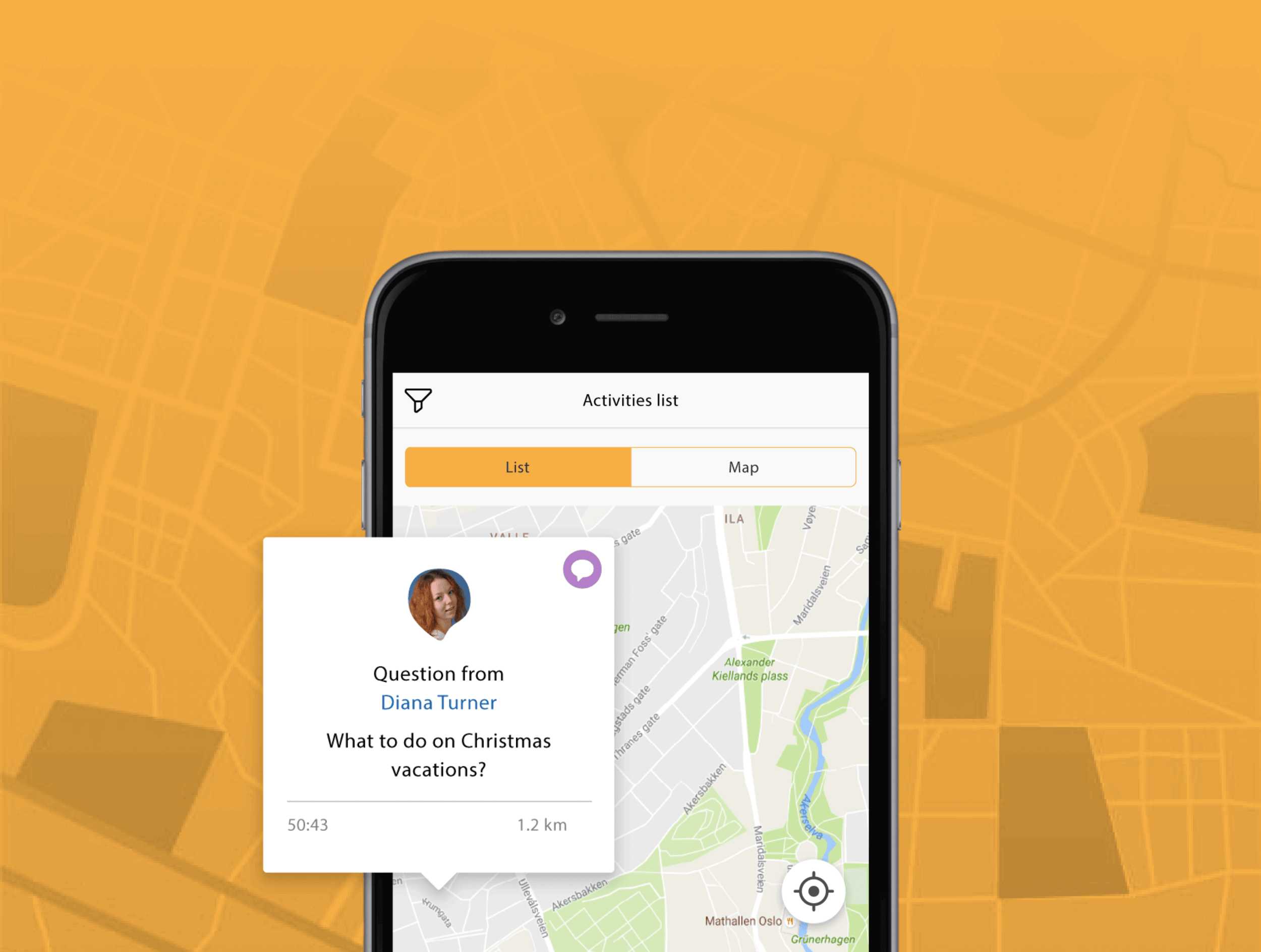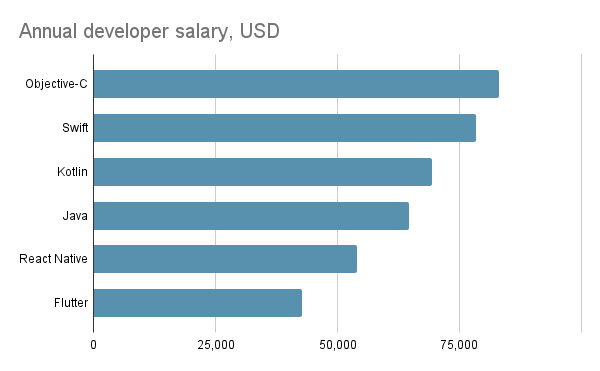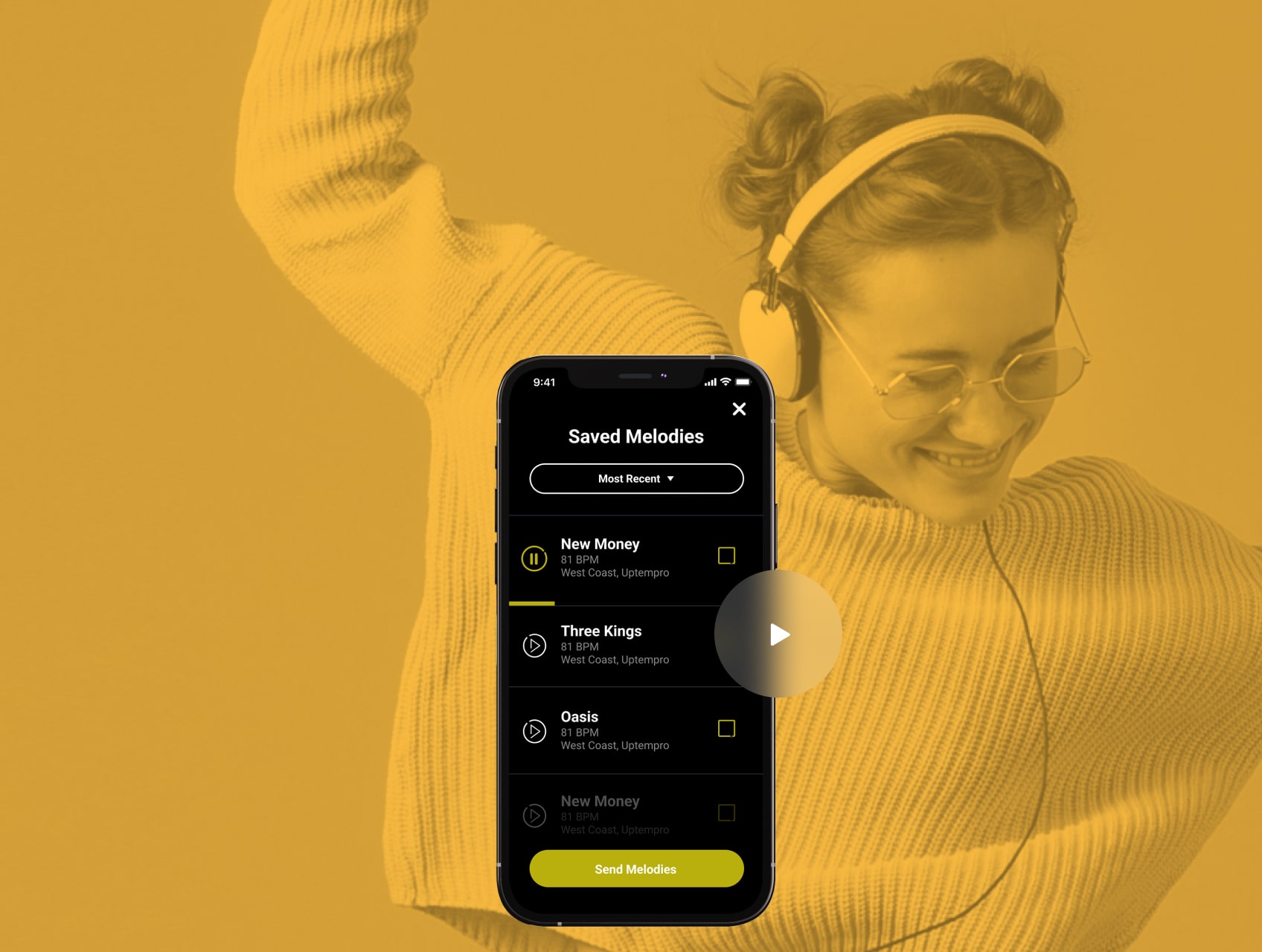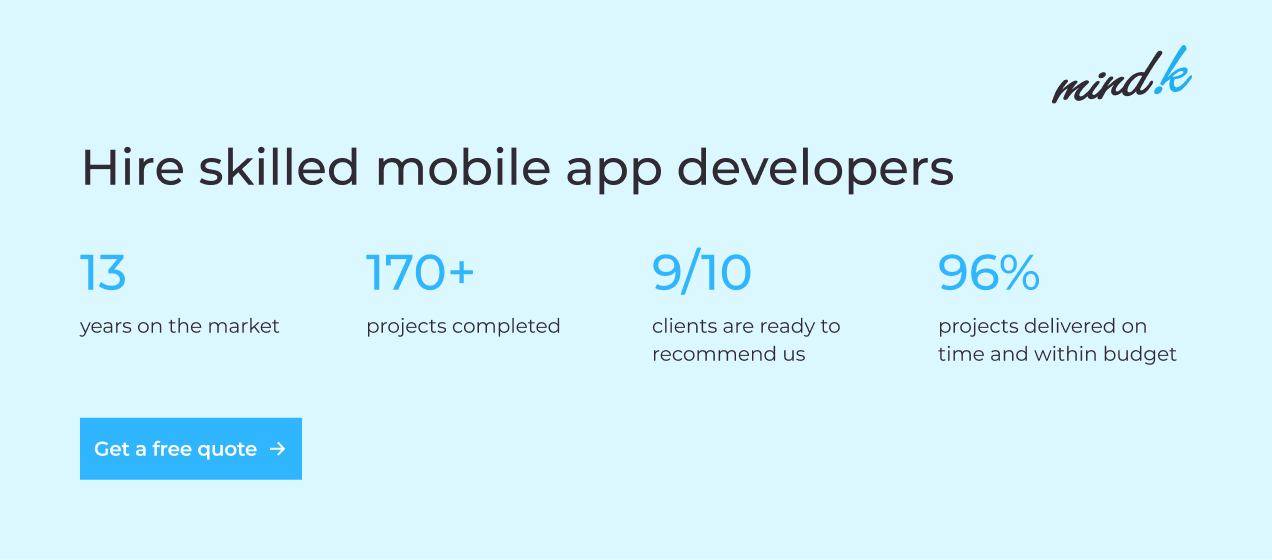This year, users will download 299 billion apps. That’s more than a 20% jump from just three years ago. Seems like it’s high time to develop your own app. But let’s be real – building an app isn’t a one-person job. You need a team of skilled professionals who can work well together to release a great product.
As a software development company, MindK often has to hire dedicated mobile app developers for our clients. This process has many nuances – from navigating the hiring process to understanding the key qualities of a great developer.
Today, we’ll share the insights we gained over 13 years to help you find your dream team And to kick things off, let’s start with the basics.
Table of contents:
- Native or cross-platform: which one to choose?
- Where to find mobile app developers?
- How much does it cost to hire a mobile app developer?
- How to evaluate mobile app developers
- How to choose a mobile app development company
Native or cross-platform: which one to choose?
Your choice of development approach will determine the type of specialists to look for. In general, there are two app development approaches ‒ native and cross-platform.
Native app development
Native applications are developed for a particular platform using specific programming languages and tools. For example, building mobile apps for Android will mean looking for specialists with expertise in Kotlin or Java. For iOS, you’ll need Objective-C and/or Swift engineers.
Native apps are perfect for the more complex use cases of hardware capabilities like camera, GPS, microphone, and accelerometer. It also suits apps that require high performance and a rich user interface. Think photo editors, video streaming, heavy animations, or mobile gaming.
However, it might be overkill for the less complex cases as you need different developers for iOS and Android.
Pros:
✔️Optimized performance, especially in complex animations.
✔️Access to all native features and hardware capabilities.
✔️Best UX, security, and reliability.
Cons:
❌ More expensive to build.
❌ Longer development cycles.
❌ Time-consuming maintenance.
Juvo, native iOS/Android app for managing local events and group communication [read the case study]
Cross-platform app development
Cross-platform applications share a single codebase for two different platforms. Engineers create reusable code that can be natively rendered across both iOS and Android. Therefore, cross-platform development is more cost-effective and takes less time. It’s a perfect fit when you need to build a relatively simple app in a short time frame without sacrificing quality.
Modern frameworks for cross-platform app development, like Flutter and React Native, allow for the creation of apps that are as good as the best native examples. Facebook, Instagram, Airbnb, Ubereats, and Walmart all use React Native to great effect. In fact, we’ve used the framework to build a popular mobile game and an award-winning entertainment app.
Pros:
✔️Up to 99% of code is reusable between iOS and Android.
✔️100% native look and feel with native UI components and modules.
✔️Faster, more cost-effective development.
Cons:
❌ Performance might suffer with the more complex apps.
❌ Some native features might be unavailable or require additional configuration.
❌ Might provide subpar UX with complex use cases.
Choosing between native and cross-platform development can be a tough call. But don’t stress about it! Just hit us up and let us know your project’s goals and requirements, and we’ll help you pick the right approach for your needs.
Where to find mobile app developers?
It’s time to look for developers after deciding how you want to build your future app . But where do you start? There are several ways to find the right experts, each with its pros and cons.
Job boards for hiring in-house developers
Probably the most obvious way to search for in-house mobile app developers is to post a vacancy on job search platforms, like Indeed or Glassdoor. Hiring in-house engineers provides a number of benefits. The entire team can work in one office, making it easier to manage and communicate.
But bringing an in-house developer to your project is definitely not cheap. Apart from paying a developer salary, you must also factor in the cost of insurance, paid vacations, dental plans, sick leaves, free coffee, gym, and other benefits. So don’t forget to consider the financial implications before hiring an in-house developer!
Pros:
✔️ No cultural barriers. When searching for in-house employees, you are more likely to find someone who shares your values and attitudes. This might prevent misunderstandings and communication issues.
✔️ Seamless team collaboration. When everyone’s in one office, you should have better productivity and interpersonal relationships.
✔️ Better control. Monitor progress and resolve issues faster with your development team under one roof.
Cons:
❌ High salary. The average mobile developer in the US earns $101,235 per year, which may be too expensive for some companies. We’ll talk more about salaries below.
❌ Additional expenses. Besides salary, factor in other expenses like taxes, employee benefits, office rent, and utility bills. Those perks can account for about 25% to 40% of the employee’s salary. And don’t forget about the hidden recruitment and training costs.
❌ Long time-to hire. If you need to begin the project ASAP, start early as the average time-to-hire in the US is 42 days. You also might find it difficult to hire qualified engineers locally.
Bidding and vetting platforms to find freelancers
When in-house developers are not an option, search for freelancers on platforms like Upwork and Freelancer, or vetting platforms like Turing and Toptal.
Searching for a mobile app developer on bidding platforms is a good option when your budget is limited. After posting your offer on sites like Upwork, you will receive bids from freelancers. Review each proposal carefully and select the candidate that best fits your requirements and budget. Be sure to check their portfolio, client feedback and ratings before making the final decision.
Finding freelance app developers is easy. On the flip side ‒ how can you be sure of hiring a reliable, qualified specialist? Well, you can’t. This is where vetting platforms come to the rescue. They claim to provide a list of candidates with proven qualifications. Such platforms use AI tools and HR managers to check technical skills and evaluate developer experience.
However, vetting platforms aren’t always transparent about the developer skills or the speed of hiring. Likewise, they can’t guarantee a successful project completion. So it’s essential to thoroughly research any platform or freelancer before committing to work.
Pros:
✔️ Cost-effectiveness. Hiring freelancers is cheaper compared to in-house developers. Vetting and bidding platforms typically charge a % of the freelancer’s earnings or a flat fee. Some platforms may also offer subscription-based models for businesses that frequently hire developers.
✔️ Pre-vetted engineers. Undoubtedly, you can’t be 100% sure of receiving the right mobile app developer skills, but freelance platforms claim to have a rigorous vetting process for each specialist.
✔️ Flexibility. Hiring freelancers is quick and almost effortless. Pick a candidate and get started. If something goes wrong and you are not satisfied with the services provided, you can hire another developer just as fast.
Cons:
❌ Poor quality. Many of our clients complained of poor quality due to freelancers taking on multiple projects at the same time and rushing to deliver results. So it’s important to carefully vet and communicate with any freelance developer. Make sure they prioritize your project and can meet its specific needs and timelines.
❌ Unreliability. When working with freelance specialists, you risk being left alone with an unfinished project. While not all freelancers are untrustworthy, it’s wise to avoid taking unnecessary risks and explore alternatives to hire app developers.
Mobile development companies like MindK
You can hire a company that already has all the resources you need to build an app.
Unlike most outsourcing firms, MindK doesn’t recruit engineers on the local market at the client’s request. All the developers available for hire have been working at MindK for at least 3 years, gaining a stellar reputation on multiple projects. Each of them has grown in-house under the guidance of experienced mentors. That’s why we’re confident about their skills (but still advise to test them yourselves with tech interviews and additional assignments).
Another advantage is that you get access to all other specialists you might need on a mobile project. Some founders think that a couple of talented developers is all they need for a successful product and justifiably become disappointed when an expensive iOS programmer spends a week setting up a CI/CD pipeline, a task your average DevOps engineer would complete in a single day (and much better at that). The same goes for product discovery, UI/UX design, quality assurance, and so on.
With staff augmentation companies, you can hire an app developer or a whole cross-functional team to take care of all development-related concerns.
| Team augmentation | Project outsourcing |
|
|
|
|
|
|
|
|
Pros:
✔️ High-quality product. With successful projects in various niches, mobile development companies have the experience and knowledge to tackle even the most complex challenges. This ensures the highest quality of the end-product.
✔️ Reliable partnership. Software development agencies are serious about their reputation, treating each project with a sense of personal responsibility. These companies won’t abandon your project when challenges arise. At MindK, for example, we don’t shy away from difficult tasks – instead, we tackle them head-on.
✔️ Reasonable price. Outsourcing companies provide local talent, lowering the costs. Moreover, you can avoid most of the overheads, paying only for the work that is done.
✔️ Flexible capacity. One freelance developer can’t do all the tasks on a project. At companies like MindK, you can hire a mobile application development team to cover all the project tasks. This can range from preparing the system requirements to designing the app’s UI/UX, automating the code deployments, assuring their quality, and taking care of the App Store publishing. You can easily scale your team up or down when the need arises.
✔️ No hidden costs. Avoid all expenses associated with in-house hiring and onboarding. Once the project estimate is complete, you’ll understand exactly how much you need to invest in the project.
✔️ Flexible engagement models. As a rule, software development companies offer various engagement models to meet their clients’ needs and requirements. For example, at MindK we provide full-cycle software development, IT team augmentation, and IT consulting.
✔️ Ongoing support. Partnering with a software development company, you won’t be alone after the project is finished. Such agencies ensure your mobile app smoothly operates after the release, and fix issues in case they arise after the app goes live.
Cons:
❌ Different time zones. Working across time zones can be a challenge. When the time difference is rather significant, it may be hard to schedule meetings convenient for everyone.
❌ Cultural differences. If you work with mobile app developers from overseas, you might face challenges, such as language barriers. If left unchecked, they might lead to misunderstandings and poor quality.
So if you need some basic functionality, a freelance developer might suffice. But if you plan to build an application with complex logic, it’s better to team up with a mobile app development company like MindK to make sure you have all the necessary experts.
How much does it cost to hire a mobile app developer?
Here are the median annual salaries for mobile developers around the world (USD) according to 2022 Developer Survey by StackOverflow:
- Objective-C – $83,165.
- Swift – $78,468.
- Kotlin – $69,318
- Java – $64,572.
- React Native – $54,000.
- Flutter – $42,657.
As you can see, cross-platform mobile developers are usually less expensive than native iOS/Android engineers. The above-mentioned figures are raw estimates. Your expenses vary greatly depending on the developer’s experience, location, education, and other factors.
When working with mobile development agencies, the costs also depend on the company size, expertise, and engagement model. Although it might be tempting to go for the lowest bid, enterprise-ready companies usually charge at least $40 an hour per developer.
If you team up with MindK, you pay an hourly rate only for the work done. Tell us a bit about your project so we can estimate the scope of work and provide you with a quote.
How to evaluate mobile app developers
When hiring a mobile app developer, it’s important to assess their hard and soft skills through the interview process, just as you would with any other professional.
Evaluating soft skills
Soft skills play a significant role in how a person interacts with team members, affecting the project success. Qualities like effective communication, empathy, and critical thinking lead to better outcomes and faster delivery.
Although it’s difficult to evaluate soft skills during the interview, you can ask a candidate to rank their soft skills from the strongest to the weakest. Request examples of how they handled specific situations in the past. You can also ask for references from previous employers or colleagues.
Picking the right personality for the project will bring you one step closer to building a high-performing development team.
Checking hard skills
When it comes to hard skills, test the candidate’s mastery of programming languages and development tools. Check both theoretical knowledge and practical experience. You can also ask about the kind of mobile apps they developed, test their knowledge of Android and iOS, or discuss the latest technologies.
- Top interview questions to ask Swift and Objective-C developers.
- Best questions to ask Android and Kotlin engineers.
Next, evaluate their practical skills through a coding task. If you’re not a tech expert yourself, it’s better to ask an experienced developer to help you prepare the test tasks. For example, at MindK we run all candidates through a multi-stage interview and assessment process. Only 4 out of 100 qualified candidates have enough skills to become a mobile developer at MindK. So drop us a line if you’ve got any questions about improving your hiring process.
How to choose a mobile app development company
If you decide to partner with a mobile app development company, the process is a little bit different.
#1 Search for potential partners
We recommend shortlisting at least 5 promising companies to make the right choice for your project:
- Ask for recommendations from your network and business partners. Some of the most successful projects we developed at MindK came from such recommendations.
- Use independent review aggregators like Clutch and DesignRush. Such platforms provide convenient filters and rankings you can use to narrow down your choice.
- Research online for companies with relevant expertise.
#2 Check each company’s portfolio
After you’ve picked several candidates, learn more about their experience and expertise. Check recent case studies to see how they work and what results they achieve.
As an example, in one of our latest projects, we developed an intuitive search engine for musicians. To test the idea without a significant investment, our team first built a quick proof of concept. After receiving positive feedback from users, we developed apps for both Android and iOS that got over 10,000 downloads in 3 months.
Melody, a Tinder-like app for musicians and composers [read the case study]
#3 Read customer reviews
The number of completed projects can prove that the company is indeed experienced. But it’s also useful to read client testimonials. Reviews can show whether a mobile app development company is capable of delivering a high-quality product within time and budget, or how it deals with troubleshooting. For instance, here is feedback from one of our clients.
#4 Contact the company’s representatives
You can start by filling out the contact form on the company’s website. Provide a few words about your project requirements, timelines, and anything considered critical to a successful partnership. The process might vary from company to company, but at MindK you can expect an answer from our technical experts in less than 24 hours.
After this, the company will schedule a brief introductory call to learn more about your project. You can usually sign a Non-Disclosure Agreement (NDA) to protect your idea before revealing any details. The company’s experts will ask about your business goals, technical requirements, and other mission-critical information.
This is the perfect time to learn more about the developer’s capabilities. Ask questions about their expertise, experience with similar projects, engineering capabilities, and terms of service. Use this opportunity to request relevant case studies and references. You can then contact their past clients to uncover all the dark secrets about the vendor.
#5 Review the proposed CVs
Once the company has your requirements, they can assess available engineers and send you the matching CVs together with the hourly rates. One red flag to be aware of at this point is suspiciously low pricing. Some companies might even attempt to sell bootcamp graduates as experienced engineers or try other shady tricks.
With project-based outsourcing, the vendor will typically come back with a project estimate and proposal. At MindK, we usually also suggest an optimal architecture, tech stack, team composition, and create a design concept before the start of the project. A precise estimation will ensure you’ll face no sudden expenses down the line.
#6 Run the interviews
Just like with in-house engineers, we recommend our clients double-check any developers they hire from outsourcing companies. Even a short interview will reveal a lot about the engineer’s personality, soft, and technical skills, to make sure they’re a right fit for your project.
The entire hiring process usually takes less than 14 days, from the first call to the start of work.
Build a stunning mobile app with MindK
An awesome product starts with an awesome team. Now that you know how to hire mobile app developers, you’re halfway there. If you need a partner with proven tech skills and industry expertise ‒ MindK fits that bill perfectly. So drop us a line and we’ll come back to arrange a free consultation with our mobile development experts.














